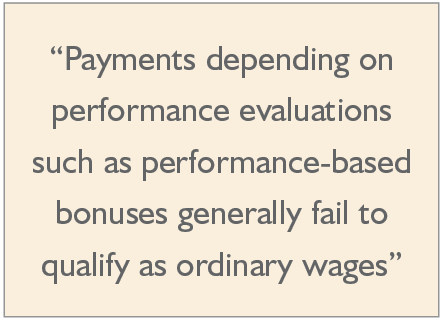
By Kurt Gerstner, Kyoung-Joo Park, Hyun-Ah Kim and Ah-won Choi, Lee International
E: kgerstner@leeinternational.com • kjpark@leeinternational.com • hkim@leeinternational.com • awchoi@leeinternational.com
Calculation of ordinary wages in Korea can have a profound impact on an employer’s labour costs, as ordinary wages are used to calculate other benefits and compensation, including overtime, compensation for unused annual paid leave and severance pay.
However, interpreting what items of compensation should be included in ordinary wages has been controversial, due to the absence of clear guidance. Whether items of compensation should be included in ordinary wages must be determined based on whether payments have been regular, consistent and fixed as compensation for labour.
For payments to be regular and consistent, they must be paid continuously at regular intervals and consistently with respect to employees having the same working conditions or meeting the same work standards. For payments to be fixed, they must be paid to employees, regardless of the employees fulfilling any additional requirements or conditions, such as accomplishing certain performance goals or requirements. Therefore, payments depending on performance evaluations such as performance-based bonuses generally fail to qualify as ordinary wages.

However, where a certain amount is paid despite poor performance, that amount may be deemed to be fixed payments. Fixed payments also mean the minimum amount of wages employees are entitled to receive if they provided labour on a given day, even if they are terminated the next day. Accordingly, payments are deemed fixed if they are conditioned on factors or events that already occurred as of the date the labour is performed, such as a condition that the employee have a certain amount of experience, or a condition that the employee has been working for the employer for a certain period of time, eg two years. In contrast, compensation that is to be paid only for the employees who are working on a designated date, would not qualify because employees cannot be paid for their labour on certain dates if they quit before such dates arrive.
Given the existing law as clarified by the Supreme Court in December 2013, employers reasonably may be able to predict and control their wage payments by reducing the amount of payment that is fixed. The Supreme Court of Korea also identified a mechanism to protect employers from having to pay back wages to employees retroactively for time periods before December 2013, when the Supreme Court clarified what compensation should be included in ordinary wages. The Court held that no additional wages may be demanded by employees in the event that employers and employees have agreed to exclude regular bonuses from ordinary wages.
However, this will apply only where there has been an understanding and agreement that (i) such bonuses should not be included in the employees’ ordinary wages, and (ii) the financial condition and survival of the employer’s business could be threatened if such agreement is found to be void and the employer is required to pay additional wages to the employees. Thus, employers must make a good faith representation and potentially prove that they have reached such an agreement with their employees based on the employers’ financial condition and the potential business crippling impact of having to pay back wages based on a re-calculation of ordinary wages.

E: kgerstner@leeinternational.com • kjpark@leeinternational.com • hkim@leeinternational.com • awchoi@leeinternational.com
T: 82 2 2262 6288
F: 82 2 2279 5020


